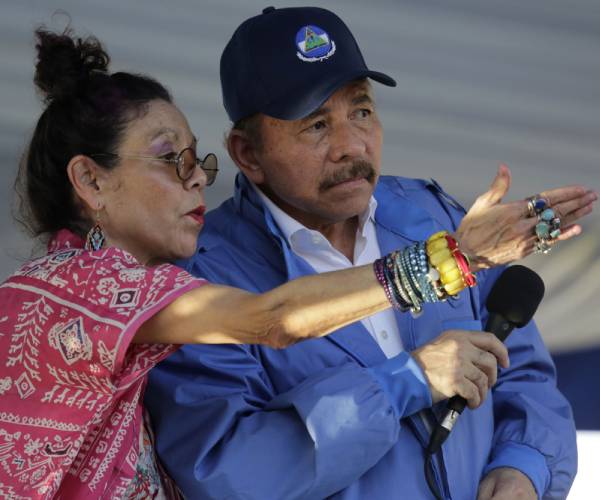
Nicaragua’s New Myth: ‘Covid-19 isn’t a problem here’
Across Latin America and the Caribbean, the dynamics of COVID-19 are shaped by informal economies, weak institutions, corruption and a lack of democratic accountability, yet in few countries has the tragedy taken on more surreal dimensions than in Nicaragua. There, the government's denial of the threat to public health and its failure to take appropriate protective measures rivals its prior self-serving misrepresentations about leveraging the Chinese to build a trans-oceanic canal.
Other countries in the region responded to the expanding threat of COVID-19, in varying degrees, with limitations on movement, commerce and other public interactions. The authoritarian regime of Daniel Ortega and his wife, Rosario Murillo, by contrast, refused to shutter businesses, kept schools open and held public rallies.
In a frighteningly typical August 2020 pandemic weekend, 3,100 public events occurred in the country, with participants often going without masks and failing to practice social distancing. Amidst indicators that the disease was rapidly spreading, the Ortega regime failed to conduct testing that would have alerted the public to the magnitude of the threat, or helped the government to respond to it.
While other Central American countries have conducted between 150,000 and 300,000 COVID-19 tests, Nicaragua has conducted a paltry 18,000. As of August, the Ortegas officially attributed only 133 deaths to COVID-19, yet its Ministry of Health indicated 4,400 more people had died than normal for the period.
The Pan-American Health Organization (PAHO) only sporadically receives data from the Ortega government and has expressed concern about its response to the pandemic.
In Nicaragua's schools (which the Ortegas have maintained open), at least 46 teachers have died. In its hospitals, where risks are elevated by a lack of knowledge regarding who is infected, at least 105 medical personnel have died and at least 786 are infected. The pandemic has further killed multiple leaders in the governing Sandinista movement itself, including Edén Pastora, Dionisio Marenco, Orlando Castillo and Orlando Noguera.
The United Nations Economic Commission on Latin America and the Caribbean (ECLAC) forecasts that Nicaragua's economy will shrink by 8.3% in 2020, the largest contraction in all of Central America.
The surrealism of the Ortega response is compounded by Daniel Ortegas declining health, with the leader disappearing from public view for months at a time and communicating with the public when seen in a pained voice.
The Ortega regime's dysfunctional response and cover-up of the pandemic has reinforced public distrust. In April 2018, when the Ortegas proposed cuts to the nation's social security system, pent-up resentment toward the regime's corruption and authoritarian practices gave rise to massive nationwide protests, precipitating a regime crackdown and violence by regime-affiliated thugs, with at least 328 killed, thousands injured, over 62,000 forced to flee the country and over 800 detained, of which more than 100 remain in government custody.
In the context of COVID-19, the Ortegas have responded with further repression and intimidation, preventing dissidents outside the country from returning and arresting them when they did.
The opposition, for its part, has proved incapable of providing alternative, unified leadership in weathering the pandemic response. While the two major umbrella groups, the Civic Alliance for Justice and Democracy and the Blue and White National Unity movement came together on July 2 to form a "national coalition", they have focused on elections to be held in November 2021, more than on the pandemic.
The opposition has also been divided by ties to past corruption, most recently former President and Liberal Constitutional Party (PLC) head Arnaldo Aleman.
Trapped between government mismanagement, repression and unclear alternatives, Nicaraguans are doing their best to protect themselves through voluntary social distancing and other measures, living in fear and distrust, while making uncoordinated decisions about going to work, church, schools and public markets.
For the region, the consequences of uncontrolled virus spread, death and the collapse of the economy and public order are grave, including refugees carrying the pandemic to neighboring Costa Rica and Honduras, expanded opportunities for criminal groups and a further opening for malign extra-hemispheric actors.
The U.S. and the international community, for its part, has continued to condemn the mismanagement, corruption and anti-democratic practices of the Ortegas. In July 2020, the U.S. Treasury froze the assets of Juan Carlos Ortega, the third Ortega son and 22nd person close to the family to be sanctioned.
In June, Organization of American States (OAS) Secretary General Luis Almagro asked for a special meeting of the OAS Permanent Council to recognize the rupture of the democratic order in the country. Yet with official elections more than a year away and the opposition struggling to truly find its voice regarding the pandemic, near-term prospects for change are limited.
Nicaraguans, their neighbors and the region will all ultimately bear the consequences.
“Nicaragua’s New Myth: ‘Covid-19 isn’t a problem here’,” Newsmax, August 27, 2020, https://www.newsmax.com/evanellis/nicaragua/2020/08/27/id/984116/.



